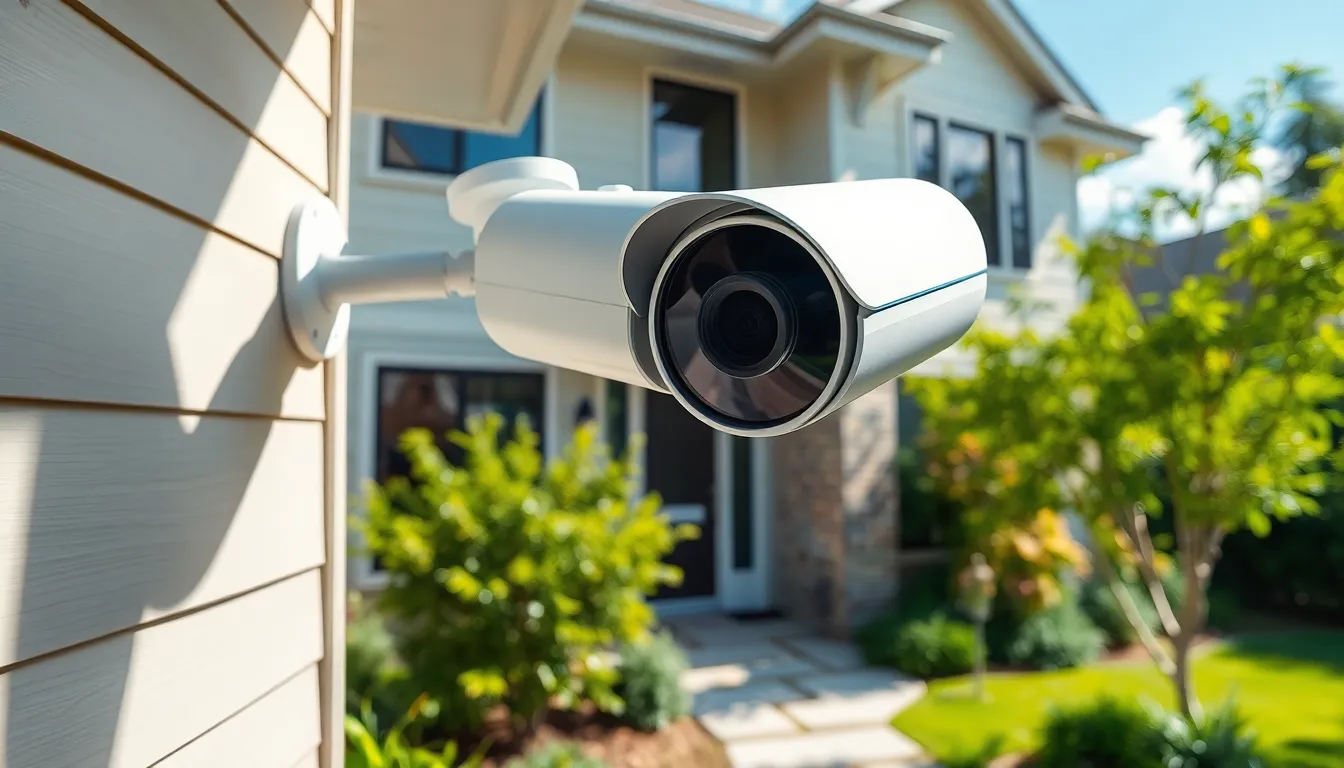Table of Contents
ToggleIn a world where leaving your front door unlocked is about as common as finding a unicorn, residential security has never been more crucial. With clever burglars lurking around every corner and the occasional raccoon trying to break into the trash, protecting your home is no laughing matter. Yet, it doesn’t have to feel like a scene from a horror movie.
Imagine transforming your home into a fortress where even the sneakiest raccoon thinks twice before making a move. From high-tech gadgets to simple DIY tricks, securing your space can be both effective and fun. With the right strategies, homeowners can sleep soundly at night knowing they’ve got their bases covered. Let’s dive into the essentials of residential security and discover how to keep those unwanted guests at bay—without sacrificing your peace of mind or sense of humor.
Importance Of Residential Security
Residential security plays a vital role in creating a safe living environment. Effective security measures not only protect property but also enhance the overall well-being of residents.
Protecting Your Home and Family
Guarding one’s home supports the safety of all family members. Implementing strong locks, security cameras, and alarm systems significantly deters intruders. Homeowners can establish barriers, such as motion-activated lights and fences, to further increase security. An added layer of awareness emerges when families discuss safety plans, fostering a sense of duty among members. Observing vulnerable entry points allows residents to make informed decisions on how to bolster defenses.
Enhancing Peace of Mind
Fostering peace of mind remains a primary aspect of residential security. Knowing that a home is secure alleviates anxiety about potential threats. Homeowners experience greater comfort and relaxation when they feel safe within their walls. Advanced security systems provide real-time notifications, empowering residents to respond quickly to any unusual activity. Building a secure home environment contributes to a strong sense of community, as neighbors feel encouraged to look out for one another. Emphasizing safety cultivates an atmosphere where families can thrive without fear.
Types Of Residential Security Systems

Various residential security systems offer homeowners multiple options for protecting their properties. Understanding the different types can help in selecting the most suitable solution.
Alarm Systems
Alarm systems provide immediate notifications in case of breaches. Wired or wireless sensors detect unauthorized access, triggering loud sirens or alerts to local authorities. Homeowners often choose systems with features like smartphone connectivity, allowing remote monitoring and control. Many modern systems integrate environmental sensors for smoke and carbon monoxide detection. Some high-end alarms even offer automation capabilities, enabling homeowners to automate responses to various situations.
Surveillance Cameras
Surveillance cameras serve as a powerful deterrent against crime. Homeowners can choose from indoor or outdoor models, with options for wired or wireless connections. Many cameras provide high-definition video quality, enabling clear identification of intruders. Night vision functionality enhances surveillance during low-light conditions. Some advanced systems even utilize artificial intelligence for motion detection and facial recognition, sending alerts when unusual activity occurs.
Smart Home Security Solutions
Smart home security solutions blend technology with convenience. These systems often include smart locks, doorbells, and window sensors, all controllable via smartphone apps. Integration with voice assistants allows homeowners to manage security settings hands-free. Automation can schedule lights to simulate occupancy or lock doors remotely. Many solutions also support the addition of various devices, creating a fully customizable security network tailored to individual needs.
Best Practices For Home Security
Home security necessitates practical measures that homeowners can implement easily. Effective strategies fortify a residence against potential threats.
Securing Entry Points
Securing entry points ensures that doors and windows remain the first line of defense. Deadbolt locks should be installed on exterior doors, providing enhanced protection. Reinforcing door frames adds additional strength against forceful entry. Window locks need to function correctly and should be used on all accessible windows. Sliding glass doors require security bars or pins to prevent unauthorized opening. It’s advisable to replace any outdated locks to maintain current safety standards. Remember, keeping all entry points locked when not in use significantly reduces vulnerability.
Incorporating Outdoor Lighting
Incorporating outdoor lighting adds another layer of security to homes. Motion-activated lights deter potential intruders by illuminating dark areas. Placing lights near entry points ensures visibility when approaching the home. Solar-powered lights are eco-friendly options that require minimal installation. Consider using timers for outdoor lights to simulate presence even when homeowners are away. Well-lit pathways and driveways enhance safety, making it harder for trespassers to approach unseen. Utilizing a combination of lighting types creates a comprehensive outdoor security scheme.
Evaluating Residential Security Providers
Evaluating residential security providers requires careful consideration of several factors. Safety and reliability play crucial roles in the selection process.
Key Factors To Consider
Experience and reputation matter. Look for providers with a solid track record in the industry, emphasizing positive customer reviews. Service offerings are significant; choose companies that provide comprehensive solutions, including alarm systems, surveillance cameras, and smart home integration. Flexibility in monitoring options, whether professional or self-monitoring, enhances customer satisfaction. Additionally, customer support should be responsive and accessible, ensuring assistance is available when needed.
Comparing Features and Pricing
Analyzing features and pricing helps fine-tune decision-making. Each provider offers unique packages with varying features. Review included services such as installation costs, contract terms, and warranty options. Security cameras may vary in quality, so consider factors like resolution, storage capabilities, and connectivity. Pricing structures often reflect service quality, but it’s crucial to ensure the best value aligns with specific needs. Comparing multiple quotes enables homeowners to make informed choices that balance features and affordability.
Residential security is essential for creating a safe and welcoming home environment. By combining technology with practical strategies, homeowners can significantly reduce the risk of intrusions. Implementing effective security measures not only protects property but also fosters peace of mind for families.
Investing in reliable security systems and establishing clear safety protocols can empower residents to feel secure in their daily lives. A proactive approach to home security encourages community safety and strengthens the bonds among neighbors. Ultimately, prioritizing residential security paves the way for a more peaceful and confident living experience.




